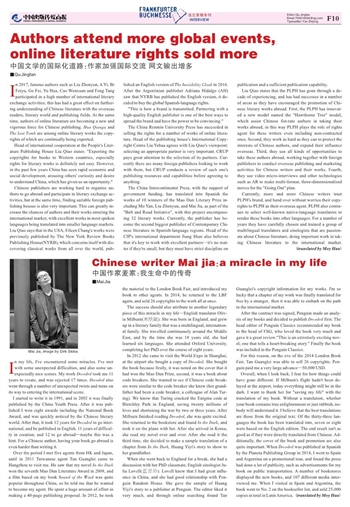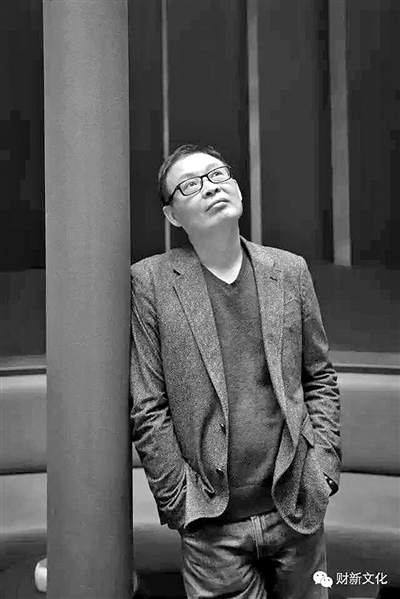In my life, I've encountered some miracles. I've met with some unexpected difficulties, and also some unexpectedly nice scenes. My work Decoded took me 11 years to create, and was rejected 17 times. Decoded also went through a number of unexpected twists and turns on its way to entering the international scene.
I started to write it in 1991, and in 2002 it was finally published by the China Youth Press. After it was published I won eight awards including the National Book Award, and was quickly noticed by the Chinese literary world. After that, it took 12 years for Decoded to go international, and be published in English. 11 years of difficulty in creation, and 12 to go abroad—maybe this was a hint. For a Chinese author, having your book go abroad is even harder than writing it.
Over the period I met five agents from HK and Japan, until in 2011 Taiwanese agent Tan Guanglei came to Hangzhou to visit me. He saw that my novel In the Dark won the seventh Mao Dun Literature Award in 2008, and a film based on my book Sound of the Wind was quite popular throughout China, so he told me that he wanted to become my agent. He spent a huge amount of effort in making a 40-page publishing proposal. In 2012, he took the material to the London Book Fair, and introduced my book to other agents. In 2014, he returned to the LBF again, and sold 26 copyrights to the work all at once.
The success should also attribute to another legendary piece of this miracle in my life—English translator Olivia Milburn(米欧敏). She was born in England, and grew up in a literary family that was a multilingual, international family. She travelled continuously around the Middle East, and by the time she was 18 years old, she had learned six languages. She attended Oxford University, completing her PhD over the course of eight years.
In 2012 she came to visit the World Expo in Shanghai, at the airport she bought a copy of Decoded. She bought the book because firstly, it was noted on the cover that it had won the Mao Dun Prize, second, it was a book about code breakers. She wanted to see if Chinese code breakers were similar to the code breaker she knew (her grandfather had been a code breaker, a colleague of Alan Turing). We know that Turing cracked the Enigma code at Bletchley Park in England, saving twenty millions of lives and shortening the war by two or three years. After Milburn finished reading Decoded, she was quite excited. She returned to the bookstore and found In the Dark, and took it on the plane with her. After she arrived in Korea, she read my novel over and over. After she read it the third time, she decided to make a sample translation of a chapter from In the Dark, Huang Yiyi's story to show to her grandfather.
When she went back to England for a break, she had a discussion with her PhD classmate, English sinologist Julia Lovell(蓝思玲). Lovell knew that I had great influence in China, and she had good relationship with Penguin Random House. She gave the sample of Huang Yiyi's story to a publisher at Penguin. The editor liked it very much, and through online searching found Tan Guanglei's copyright information for my works. I'm so lucky that a chapter of my work was finally translated for free by a stranger, then it was able to embark on the path to the international market.
After the contract was signed, Penguin made an analysis of my books and decided to publish Decoded first. The head editor of Penguin Classics recommended my book to the head of FSG, who loved the book very much and gave it a great review:"This is an extremely exciting novel, one that tells a heart-breaking story." Finally the book was included in the Penguin Classics.
For this reason, on the eve of the 2014 London Book Fair, Tan Guanglei was able to sell 26 copyrights. Penguin paid me a very large advance—50,000 USD.
Overall, when I look back, I fear for how things could have gone different. If Milburn's flight hadn't been delayed at the airport, today everything might still be in the dark. I want to thank her for "saving my life" with the translation of my book. Without a translation, whether your book contains true enlightenment or just rubbish, nobody will understand it. I believe that the best translations are those from the original text. Of the thirty-three languages the book has been translated into, seven or eight were based on the English edition. The end result isn't as good as if they were directly translated from Chinese. Additionally, the cover of the book and promotion are also quite important. When Decoded was published in Spanish by the Planeta Publishing Group in 2014, I went to Spain and Argentina on a promotional tour, and found the press had done a lot of publicity, such as advertisements for my book on public transportation. A number of bookstores displayed the new books, and 107 different media interviewed me. When I visited in Spain and Argentina, the book went to No. 2 on the bookseller list, and sold 25,000 copies in total in Latin America. (translated by Moy Hau)



